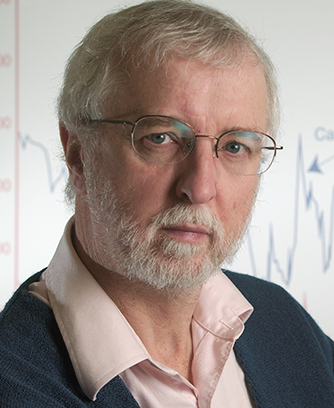Internationally Renowned Climatologist Raymond S. Bradley to Deliver Lecture on the Science and Politics of Global Warming
Oct. 2 talk continues Pitt’s University Honors College Climate Change Series
 In the Northern Hemisphere, the period of 1983-2013 was likely the warmest 30-year period in 1,400 years, according to findings released this week by the United Nation’s Intergovernmental Panel on Climate Change. Internationally renowned climatologist Raymond S. Bradley says such environmental extremes are driven by the accumulation of carbon emissions in Earth’s atmosphere and the failure of governments around the world to reduce emission levels.
In the Northern Hemisphere, the period of 1983-2013 was likely the warmest 30-year period in 1,400 years, according to findings released this week by the United Nation’s Intergovernmental Panel on Climate Change. Internationally renowned climatologist Raymond S. Bradley says such environmental extremes are driven by the accumulation of carbon emissions in Earth’s atmosphere and the failure of governments around the world to reduce emission levels.
Bradley will deliver a free and public lecture titled, “The Science and Politics of Global Warming,” at 2 p.m. Oct. 2 in the Carnegie Lecture Hall of the Carnegie Museum, 4400 Forbes Ave., Oakland. It is the second lecture in Pitt’s University Honors College Climate Change Series, a long-term program to educate the Pitt community and the general public on issues regarding climate change. Reservations are encouraged; RSVP here.
During the lecture, Bradley will discuss the recent findings of the U.N.’s Intergovernmental Panel on Climate Change, the factors that have stalled U.S. legislation to reduce emission levels, and the potential ramifications of political inaction on future climate change. Following the lecture, the Honors College will host a climate change informational fair, comprised of local nonprofit and student organizations working on issues pertaining to the environment; the fair will be held just outside of the Carnegie Lecture Hall.
Bradley is a Distinguished University Professor and the director of the Climate System Research Center at the University of Massachusetts at Amherst. His research focuses on climate variability and the root causes of climate change. He has served as an advisor for the U.S., Swiss, Swedish, and U.K. National Science Foundations as well as the U.S. National Research Council, the Inter-Governmental Panel on Climate Change, and the U.S.-Russia Working Group on Environmental Protection.
Bradley has authored, coauthored, or edited 13 books on climatic change and paleoclimatology, including Climate Change and Society (Stanley Thornes Publishers, 2001) and Paleoclimatology: Reconstructing Climates of the Quaternary (Academic Press, 1999). He also has published more than 190 articles in such notable publications as Science, Nature, and Proceedings of the National Academy of Sciences.
Bradley is a 2007 recipient of the European Geosciences Union’s Hans Oeschger Medal, which recognizes scientists who have made outstanding achievements in ice research and/or climate change analysis. He is a fellow of the American Association for the Advancement of Science, the American Geophysical Union, and the Arctic Institute of North America. Bradley’s research has been awarded funding from the National Science Foundation, the National Oceanic and Atmospheric Administration, and the U.S. Department of Energy.
Bradley earned a Bachelor of Science degree as well as a Doctor of Science degree from the University of Southampton in England, in 1969 and 2003, respectively. He also earned MA and PhD degrees at the University of Colorado in 1971 and 1974, respectively.
The lecture is cosponsored by the Carnegie Museum of Natural History, Phipps Conservatory and Botanical Gardens, and The National Aviary. For more information, call 412-624-6880.
Other Stories From This Issue
On the Freedom Road

Follow a group of Pitt students on the Returning to the Roots of Civil Rights bus tour, a nine-day, 2,300-mile journey crisscrossing five states.
Day 1: The Awakening
Day 2: Deep Impressions
Day 3: Music, Montgomery, and More
Day 4: Looking Back, Looking Forward
Day 5: Learning to Remember
Day 6: The Mountaintop
Day 7: Slavery and Beyond
Day 8: Lessons to Bring Home
Day 9: Final Lessons

